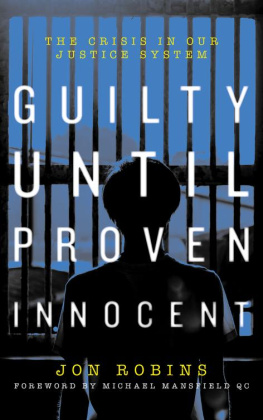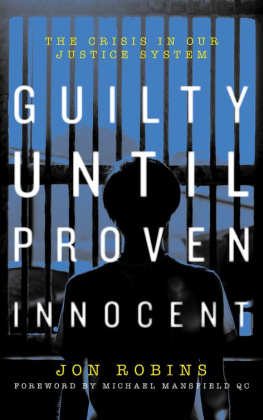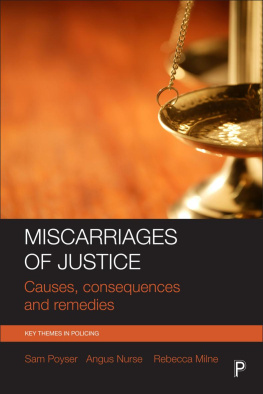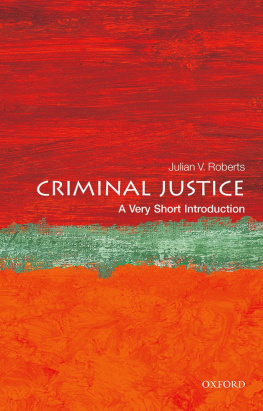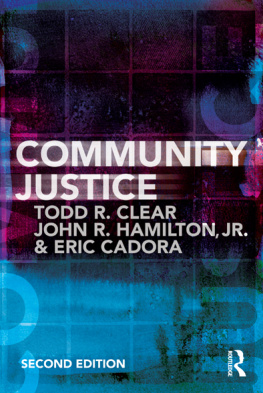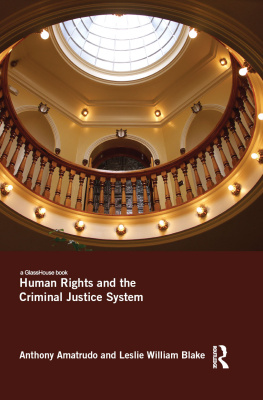I am reminded of the famous Monty Python sketch in which four Yorkshiremen competitively gripe about just how bad the bad old days were: There were 150 of us living in a shoebox in the middle of the road, says one. Cardboard box? replies his friend. You were lucky
However, having just completed my fiftieth year of practice at the Bar, I reckon I am well placed to compare the state of the legal world as it is now, relative to my early years of legal practice.
Its not that nothing has changed; it has got worse. The need for active vigilance is now more imperative than ever. Once again, Jon Robins, in his groundbreaking and persistent work, has performed the vital task of pinpointing where the justice system is continuing to fail.
Those who cannot remember the past are condemned to repeat it. As I write this, I look back over the past six months. In 2016, Labour MP David Lammy was asked by the then Prime Minister David Cameron to conduct an investigation into the over-representation of black and minority ethic people in the criminal justice system.
You would think from the results of his review that the lessons contained in the landmark Macpherson Report, which was published almost twenty years ago after the racially motivated killing of Stephen Lawrence, was merely a straw in the judicial wind.
In his report, David Lammy describes prejudice, bias and discrimination in the justice system as a social time bomb that requires urgent action. He has called for a review of the common law doctrine of joint enterprise, which has disproportionately targeted young black people in our cities (see Chapter 10).
It was the authorities attitude to black youth, and its impact on the investigation, that lay at the heart of the grotesque mishandling of Stephen Lawrences murder case, as well as the appalling treatment of his family. A matter still to be scrutinised by the undercover policing inquiry, which was established by Theresa May amid cries of horror at the idea of an unaccountable police state within a state. There has been an unexplained and inexcusable delay since the inquiry was launched in July 2015. Nearly three years on and still no evidence has been heard. Maybe the inquiry itself will be undercover?
Two cases were dropped in the space of a week in December 2017, due to shocking failures to disclose by the police and Crown Prosecution Service. There have been further collapses in the new year. In one case (Liam Allan, see Chapter 6), the withheld material, communications between complainant and defendant, could not have been more obviously vital. The prosecution acted like another of John Cleeses best-known creations Fawlty Towers Spanish waiter, Manuel: I know nothing.
For those of us who practise in the criminal courts, such disclosure failures are an all too common experience. They are certainly not limited to sexual offences. Figures show that, in 2016, 900 cases were dropped due to issues with disclosure, up from 732 the previous year and 537 in 2014.
For the Director of Public Prosecutions, Alison Saunders, to attempt to assure us that there have been no miscarriages as a result, as she did earlier this year, is an extraordinary claim. Tell that to the young student, Liam Allan, who was very nearly convicted and his life almost ruined.
What is going on? We went through this in the 1980s with the Irish cases the Birmingham Six and Judith Ward discussed in this book. The judges hoped such gross non-disclosure would not be repeated. Subsequently, various safeguards were put in place, but, apparently, to little avail. At the end of the day, it depends on the quality of the personnel charged with the duty of disclosure as well as a conscientious judiciary.
Within a few days of such revelations, the forensic science regulator, Dr Gillian Tully, issued a stark warning that without urgent action there would inevitably be miscarriages of justice.
Wait a minute. Weve been here too. Forensics, like vast areas of the justice system and the health service, have been deregulated and fragmented in the private sector. In 2012, the government abolished the Forensic Science Service, which, despite its failings, tried to set basic benchmarks.
There is, of course, another agenda at play here. Austerity. There have been huge cuts across the board. By the end of the decade, the Ministry of Justices budget (which covers prisons, probation and the legal aid system) will have been slashed by 40 per cent since the coalition government came to power in 2010.
Such cuts are already impacting on the availability of quality lawyers, police and prison officers and even judges.
When I started out, British justice was held up as an example to the rest of the world. It has been diminished and demoralised. I write this without accounting for changes to legal procedure that have changed the landscape: the abolition of the right to silence; the relaxation of rules relating to the admission of hearsay and previous convictions; the abolition of the need for corroboration; and the pressure for early pleas. Its not so much convicting the guilty, but putting the innocent at risk.
You are guilty until you prove you are not.
Michael Mansfield QC
May 2018
The front door crashes open. Its just gone 5 a.m. There are feet pounding up the stairs. As you stumble out of bed, youre taken aside. You hear the words that you have heard so many times before on TV: You dont have to say anything. The neighbours curtains twitch as, head bowed, youre placed in the backseat of a police car. You have nothing to hide. You have faith in the criminal justice system but your nightmare is only just beginning.
A s a lawyer specialising in criminal defence for twenty years, I have news for you: many of the people I represent are not guilty. How sure can any of us be that the police will realise when they have taken a wrong turn? That the CPS will decide not to take the matter any further? That the jury will find sufficient doubt to outweigh their no smoke without fire prejudice?
It has been more than a quarter of a century since scandalous miscarriages of justice such as the Guildford Four and the Birmingham Six shocked the public out of its complacency about the supposed infallibility of our courts. Widespread concern led to a royal commission and fundamental reforms. Such reforms never fixed the problem, and it would be naive to think that they ever could.
As practitioners in our criminal courts, we witness at first hand the frailties of the justice system. This book is being published at a time when an underfunded system is creaking. Unprecedented pressures on the police and prosecution, swingeing cuts to the Ministry of Justices budget, not to mention two decades of frozen legal aid rates for defence lawyers have all contributed to a growing crisis.
Should the aim of the criminal justice system be to ensure that all guilty people are convicted, even if that means a few innocent ones go down? Or should it strive to protect the innocent at all costs, even if that means letting a few that are guilty slip away? Both options involve miscarriages of justice, but the presumption of innocence favours the latter over the former.
Sadly, that presumption has been under heavy fire over the last two decades from ambitious politicians and a press quick to be outraged, but reluctant to understand.
The cases that feature in this book should send shivers down the spines of every law-abiding citizen. The increasing focus on convicting the guilty instead of protecting the innocent means that we may soon all have cause to fear the dawn raid.
Rod Hayler
Old Bailey Solicitors
W hen a miscarriage of justice case hits the headlines, it is easy to dismiss it as a shocking one-off aberration a minor hiccup in a system that otherwise functions in an exemplary fashion. After all, we are told by politicians and lawyers that our criminal justice system is the finest in the world.

